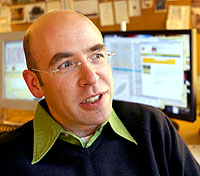MED launches trailblazing genomics database
Unprecedented sharing of data seeks new cures

A new School of Medicine Web site that could establish a precedent for open and collaborative genetics research may also help researchers find genetic links to many common ailments, such as high cholesterol and high blood pressure.
The Genomic Medicine Database (GMED), launched last month by researchers at the MED department of genetics and genomics, is a searchable collection of prepublication results from the BU researchers’ genetic analysis of 320 families from the Framingham Heart Study. The study, conducted by the National Heart, Lung, and Blood Institute (NHLBI) initiative, has tracked the health of families in Framingham, Mass. since 1948, and has been overseen by BU since 1971.
Work began on the database in 2005, when geneticists scanned blood samples from 1,320 individuals for 100,000 genetic markers, known as single nucleotide polymorphisms (SNPs), and then looked for correlations between those genetic differences and about 10 medical conditions.
“This allowed us to find sites of variation where having one flavor or another of these SNPs may indicate a predisposition to a certain disease,” says Marc Lenburg, a MED research assistant professor of genetics and genomics and director of bioinformation technology. Lenburg and fellow researchers, led by department chair Michael Christman, published an article in Science this past April about their study’s first significant finding: a genetic variant that may predispose 10 percent of people with European or African ancestry to obesity.
Scientific discoveries are validated when they are independently replicated by other researchers. While the genetic link with obesity had been replicated in tests of different populations — in Germany, in Chicago, and at Boston’s Children’s Hospital — the correlations between genetic variants and the remaining medical conditions found by the BU researchers have yet to be verified by other genomic studies, a fact that spurred Lenburg and his colleagues to make these “candidate associations” public as soon as possible. They believe that freely sharing their results will speed replication of the genetic associations, says Alan Herbert, a MED assistant professor of genetics and genomics. And replication, Herbert adds, “is a necessary step to developing drugs and diagnostics.”
This kind of open sharing is not the norm in cutting-edge genetics research because scientists often build their careers on published research and discoveries they can claim as their own. Indeed, this spring, the World Health Organization was accused of putting scientific prestige above the best interest of world public health by keeping the newly discovered genetic sequence of the mutating bird flu virus in a password-protected database, open only to researchers who had contributed data. (See related article.)
But the BU geneticists believe intellectual property concerns should yield to the increased speed of discovery that collaboration could bring. Hence the creation of GMED, where a visiting scientist can type a medical condition, such as cholesterol, into the “Phenotype Browser” to see all the possible associated genes, or begin with a particular gene and bring up the traits correlated with it using the “Genome Browser.”
So far, according to the creators, the database has attracted about 4,000 visitors a day. “This shows why the computer works so well with genetics research,” says David Ulrich, president of Brookline-based Gene-Home, Inc., a company that develops software to manage gene expression data and a collaborator in the GMED project. Ulrich points out the usefulness of the Internet in sharing genetics research results with other scientists. “How else would you be able to share that data and present it in a way that’s easy to understand?” he asks. “You certainly couldn’t fit it into a journal article.”
The geneticists plan to expand GMED soon with data from a “denser” gene map covering 500,000 SNPs and associations with additional medical conditions. And, says Lenburg, “as we get reports of these associations either being replicated in other populations, or not being replicated, we’ll keep the database updated.” They also hope to spur other genome-wide studies to follow their model of making prepublication data public and searchable.
“One of our goals is to establish the precedent that this information should be made publicly available and not locked away,” Herbert says. “The understanding about what makes us human and affects our risk of disease should not be owned by anyone.”